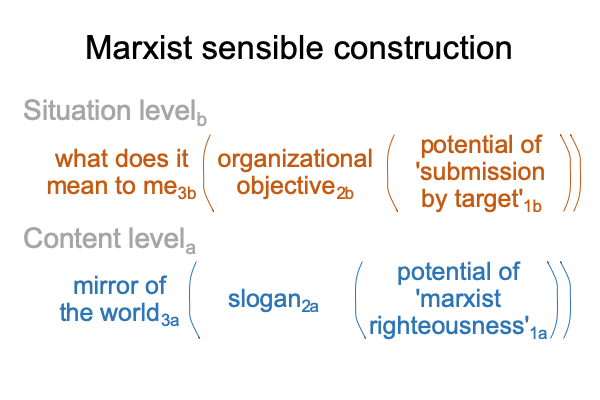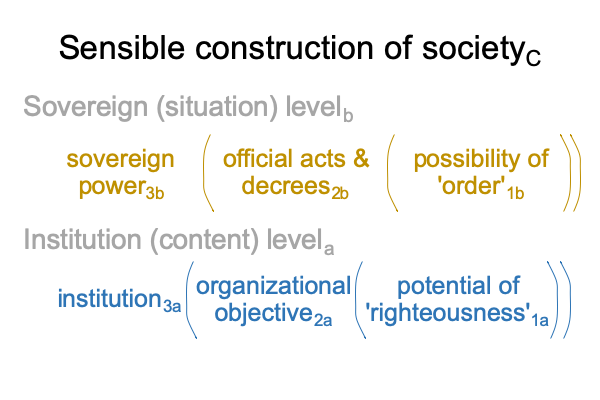0014 Part 3 concerns the attractions and power of marxism.
The individual is attracted to classical liberalism.
The discontented are attracted to marxist (il)liberalism.
The current iteration of marxist religion is Big Government (il)Liberalism (BG(il)L).
0015 What do marxists have that liberals do not?
Here is a picture of the marxist’s sensible construction

0016 Where is the perspective levelc?
Is it too horrible to view?
The Enlightenment perspective-level actuality (equality, freedom and fraternity2c) addresses three important aspects of human sociality in our current Lebenswelt.
0017 According to Marx, these are not sufficient.
What else is required?
First (A), people form cohesive classes or groups. May I call them, “institutions”? Second (B) these classes or groups invariably oppress and exploit one another, culminating in one (the state) enforcing order. Third (C), the state eventually functions as an instrument of the oppressing class.
0018 Weirdly, Marx’s insight is captured in the chapter on presence in the masterwork, How To Define The Word, “Religion”. The three elements appear in the institution (content) and sovereign (situation) levels of the societyC tier.

0019 In theory, Enlightenment liberalism achieves order1b, while using the fewest official acts and decrees2b. It cultivates personal commitments2a to life (equality), liberty (freedom) and the pursuit of happiness (fraternity)2c. Civic culture consists of various fraternal institutions3a, some Christian (“religious”) and some not Christian (“not religious”)1a, pursuing diverse objectives2a.
Righteousness1a does not arise from within Enlightenment liberalism. Rather, Enlightenment liberalism is conducive to a wide variety of inspirations. Liberal righteousness1a demands that each individual pursues opportunities1b offered by competing civic institutions3a according to their talents and dispositions1a.
0020 In contrast, the Marxist vision proposes that a number of otherwise civic institutions3a (A) will pursue organizational objectives2a (B) that require official acts and decrees2b for their implementation1b (C).
0021 Hazony offers examples.
Ideally, public education should be implemented through a general decree stating that all individuals over a certain age must pass a civic exam in order to gain citizenship. The exam would be offered by (not one but) a suite of competing voluntary institutions, each operating with transparency due to competition. Education may be subsidized by vouchers to parents.
In practice, modern education engages unionized teachers (A) who demand a monopoly over “public” instruction and examination, as well as a host of other organizational objectives (B), that require state enforcement through official decrees (C).
In sum, Big Government (il)Liberal education exemplifies the Marxist vision.
0022 Hazony offers other examples. But, the point is clear. Marxist righteousness1a sensibly constructs organizational objectives2b, that, on one hand, arise from directly from the potential of submission by a target (individuals or institutions)1b, and, on the other hand, are virtually situated by official acts and decrees2b in the sensible construction of societyC.
0023 One reason why Marxist ideas are so attractive is that they promote a righteousness1a that both demands submission from others1b and entangles sovereign power3b.
The task of identifying like-minded individuals is relatively easy, since conservatives, Christians, nationalists and (above all) enlightened liberals espouse other styles of righteousness1a. All institutions in a modern civic society are vulnerable to infiltration by marxists.
In sum, marxists can easily identify one another, selectively promote one another, and humiliate perceived competition within each institution. Those who are not marxist within each institution are increasingly expected to toe the party line and to promote entanglements with sovereign power.
0024 Amazingly, Enlightenment liberals find themselves dispossessed by the very institutions that they built.
Does this imply that the marxists hold a perspective-level actuality2c that (if you will excuse the pun) trumps equality, freedom and fraternity2c?
Hazony does not directly raise this question.
He does so, indirectly.
He discusses the flaws that make marxism fatal.
